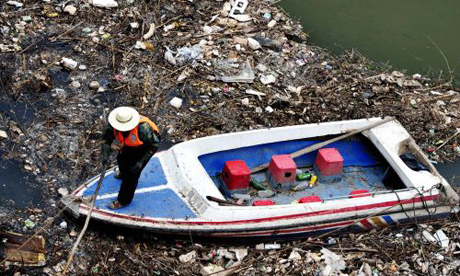One-third of China's Yellow river 'unfit for drinking or agriculture'
- guardian.co.uk, Tuesday November 25 2008 16.01 GMT

A worker clears rubbish from the Yellow river in Lanzhou in north-west China's Gansu province. Water quality along one third of China's Yellow river is now unusable because of pollution. Photographer: AP
Severe pollution has made one-third of China's Yellow river unusable, according to new research.
Known as the country's "mother river", it supplies water to millions of people in the north of China. But in recent years the quality has deteriorated due to factory discharges and sewage from fast-expanding cities.
Much of it is now unfit even for agricultural or industrial use, the study shows.
The survey, based on data taken last year, covered more than 8,384 miles of the river, one of the longest waterways in the world, and its tributaries.
The Yellow River Conservancy Committee, affiliated to the ministry of water resources, said 33.8% of the river system's water sampled in 2007 registered worse than level five. That means it is unfit for drinking, aquaculture, industrial use and even agriculture, according to criteria used by the UN Environment Programme.
Only 16% of the river samples reached level one or two, the standard considered safe for domestic use.
The Yellow River is China's second-longest after the Yangtze, flowing west to east across the country through areas with high concentrations of factories.
The report said waste and sewage water discharged into the system last year totalled 4.29bn tonnes. Industry and manufacturing made up 70% of the discharge into the river, with households accounting for 23% and just over 6% coming from other sources.
"It's not surprising," said Wen Bo, China programme director of the US-based environmental group, Pacific Environment. "They are just treating the river as a dumping site. It's basically a sewage channel for the provinces that share the river."
He told Associated Press that many polluting firms in the upper and middle reaches of Yellow river have avoided close local government scrutiny or had been protected because they provided jobs. There was no mechanism to allow richer provinces downstream to help poorer, polluting neighbours clean up, he added.
Li Xiaoqiang, publicity chief with the Yellow River Conservancy Committee, told the state news agency, Xinhua, that people needed to become aware of saving and protecting water if the problem was not to spread further.
China's State Council launched a nationwide campaign among industrial enterprises to save energy and slash the discharge of pollutants in the second half of last year.
"I wish a harmony could be achieved between development, utilisation, and protection of the river someday," said Li.
A survey taken the previous year showed that 31.1% of the water was of level five standard, although the area sampled was slightly smaller. The total waste and sewage water discharged into the system was also slightly lower.
The ministry of environmental protection warned this summer that pollution of China's waterways remained "grave". More than 20% of water tested in nearly 200 rivers was not safe to use, it added.
The ministry has tried to shut down polluting factories along China's main waterways, but its power is limited because local environmental protection bureaus are under the control of local governments.

 In a few weeks, 21—year-old Han Chu, another Greenpeace volunteer from Beijing, and 28-year-old Li Yan, Greenpeace climate campaigner, will jump on board.
Their mission?
To tell the world that China’s youth also care about the planet, worry about their future, and demand world leaders do something concrete now to stop the earth’s most serious environmental threat – climate change.
In a few weeks, 21—year-old Han Chu, another Greenpeace volunteer from Beijing, and 28-year-old Li Yan, Greenpeace climate campaigner, will jump on board.
Their mission?
To tell the world that China’s youth also care about the planet, worry about their future, and demand world leaders do something concrete now to stop the earth’s most serious environmental threat – climate change. 

 The Road Ahead: The First Green Long March. This new documentary, which screens at the Queens International Film Festival next Saturday, November 8th at 11am,
The Road Ahead: The First Green Long March. This new documentary, which screens at the Queens International Film Festival next Saturday, November 8th at 11am, 



